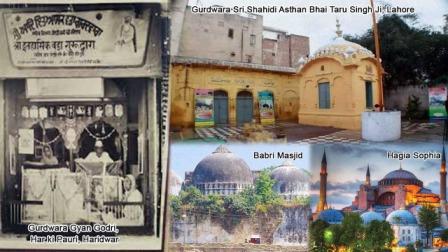

There is news that some individuals in Pakistan might convert Gurdwara Sri Shahidi Asthan in Lahore, site of martyrdom of Bhai Taru Singh Ji, into a Mosque. This is most unfortunate. Yet, the development is not in isolation.
Recently in Turkey, the President converted the Hagia Sophia museum into a Mosque. The move obliterated wiped out the earlier history when the Hagia Sofia was a grand Church and later converted into a Mosque.
A similar wiping out of history is set to happen in India on August 5 when the Prime Minister is set to inaugurate the construction the Ram Janam Bhoomi Mandir in Ayodhya.. This will wipe out the history of the Babri Masjid, demolished by Hindutva goons in 1992. This will also wipe out the Buddhist claim that the site was a monastery at one point in history.
The site of the new temple is supposedly the site of Lord Ram’s birth. Never mind that Lord Ram was a mythological figure, the Ramayan itself is mythology. The whole narrative of the Hindutva forces in power now is that Lord Ram was not mythology. The temple will be evidence. Never mind that Nepal now claims Lord Ram was born there. There are already claims that Lord Ram was born in what is now Pakistan, near Lahore.
Gurdwara Sri Shahidi Asthan is where a Sikh Taru Singh was given a choice by Zakaria Khan then governor of Lahore to convert to Islam or have his hair cut off. Taru Singh rejected conversion and in response his hair and scalp was torn off. Later Taru Singh bled to death on July 1, 1945. This event led to the phrase ‘khopdian luhaiyan‘ in the Sikh Ardas.
In 1762 A.D., the Sikh army conquered Lahore and took over the public square where Bhai Taru Singh was scalped.. A Gurdwara was built on the grounds in the premises of the shrine to the Sufi saint Pir Shah Kaku next to the Shaheed Ganj Mosque.
Shortly after the commencement of British rule in 1849, the first petitions for retrieval of the Mosque were made by Nur Ahmad. British authorities cited the existence of the Bhai Taru Singh shrine as reason for maintaining the status quo and Sikhs were allowed to continue worshipping at the site. The entire site was handed to the Sikh community on 22 December 1927 by British authorities.
Yet, another appeal against Sikh ownership by the secretary of Anjuman-e-Islam, Syed Mohsin Shah, was rejected in 1934 and the Mosque was demolished on 8 July 1935. The act triggered communal riots in Lahore. In 1938, Fazl-i-Hussain, the then Prime Minister of Punjab under British rule, advised Muslims to give up claims to the site.
After independence, the Gurdwara came under the control of the Pakistan government. Appeals by Muslims were rejected in 1950s, 1980s and Muslims were barred from converting the site into a Mosque. A new and larger Gurdwara building was built on the grounds of Gurdwara Bhai Taru Singh in 2004.
Now upon the move of converting the Gurdwara into a Mosque, India Punjab chief minister Captain Amarinder Singh has raised the issue with the Indian Minister of External Affairs. Yesterday, the government of India lodged a protest with the Pakistani High Commission. Most likely that would halt Pakistan’s move. At least, temporarily. Meanwhile there is a police complaint lodged by the Pakistan Sikhs against the attempt in Pakistan itself.
But that leads us to another question. Does India respect the religious sites of the Sikh faith?
Take for example the Gurdwara Gyan Godri meaning ‘treasure of knowledge’, Haridwar. This Gurdwara is related to Guru Nanak visiting Haridwar during his first Udasi.

Wikipedia states a small building of the Gurudwara existed till 1975 at Landhora House area in Har Ki Pauri of Haridwar. A tenant, Ram Piari, used to pray before a copy of the Guru Granth Sahib. After the Kumbh Mela stampede of 1966, Haridwar administration acquired Landhora House to widen Har Ki Pauri in 1979 and demolished the Gurudwara with the assurance they will rebuild it.
Another version, on the ground, by people agitating for the reconstruction of the Gurdwara is that Hindu mobs tore down the Gurdwara in 1984, during the anti-Sikh pogrom.
Whichever version of history one might believe, the current reality is Sikhs have not been allowed to reconstruct Gurudwara. Today, the office of The Bharat Scouts and Guides stands where Gurudwara Gyan Godri once existed. Google Maps show the location but says it is ‘temporarily closed’ for the last 36 to 41 years!
Since then, every year Sikhs try to go to the location to make a plea for the restoration of the Gurdwara. Every time, the police arrests them and deports them outside Haridwar. It has been a four decade long peaceful protest fallen on deaf ears.
Similarly, many Gurdwaras were destroyed all over the cow-belt in the 1984 anti-Sikh pogrom. Many of them have not been restored. This is Guru Nanak’s 550th birth anniversary year. Would it not be wise of the government to restore the Gurdwara associated with the Guru?
A similar issue cropped up in September last year in Puri where the Mangu Mutt is located near the Jaganath temple. The reason to demolish the Mutt was again beautification and widening of the road.
The CM of Punjab had urged the CM of Odisha to preserve the historical structure from Guru Nanak’s time. It is said this is where he uttered the Sikh Aarti. The CM of Odisha had assured the Sikhs that illegal shops in the complex will be demolished but the precincts of the Mutt will be preserved. There is no later news on the topic.
The happenings lead to two questions:
1) What is the point of democracy when powers appease majority sentiments and try to rewrite history. History belongs to all of us, to the human civilisation. Yes, many say the history of humankind is the history of barbarism.
That barbarism, extreme bloodshed, attempts to take over sacred spaces of religious communities, were instances of how monarchy functioned. But democracy is not monarchy. Democracy is supposedly an improvement on monarchies. In a democracy there is an exchange of rights and duties between citizens and states. This include rights of minorities. In fact, specifically minorities, for majorities can form governments and carry out whatever moves they fancy.
2) What should be our policy to deal with historical structures? The West is well known for saving the slightest historical evidence and building monuments. Admittedly, most Western countries are Christian and minorities might not have much space there given how those civilizations have advanced.
However, the beauty of South Asia, of India, is its diversity and cosmopolitanism. It is incumbent upon us that to save democracy we do not give in to majoritarian push – whether Hindutva in India or Islam in Pakistan. Instead of barbarism, history becomes an understanding of layer upon layer of events which can teach us how to coexist peacefully with one another.

Disclaimer : PunjabTodayTV.com and other platforms of the Punjab Today group strive to include views and opinions from across the entire spectrum, but by no means do we agree with everything we publish. Our efforts and editorial choices consistently underscore our authors’ right to the freedom of speech. However, it should be clear to all readers that individual authors are responsible for the information, ideas or opinions in their articles, and very often, these do not reflect the views of PunjabTodayTV.com or other platforms of the group. Punjab Today does not assume any responsibility or liability for the views of authors whose work appears here.
Punjab Today believes in serious, engaging, narrative journalism at a time when mainstream media houses seem to have given up on long-form writing and news television has blurred or altogether erased the lines between news and slapstick entertainment. We at Punjab Today believe that readers such as yourself appreciate cerebral journalism, and would like you to hold us against the best international industry standards. Brickbats are welcome even more than bouquets, though an occasional pat on the back is always encouraging. Good journalism can be a lifeline in these uncertain times worldwide. You can support us in myriad ways. To begin with, by spreading word about us and forwarding this reportage. Stay engaged.
— Team PT


Copyright © Punjab Today TV : All right Reserve 2016 - 2024 |